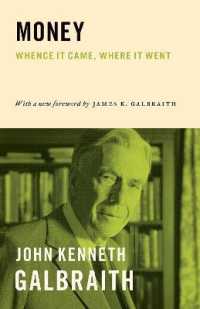- ホーム
- > 洋書
- > 英文書
- > Science / Mathematics
基本説明
Discusses how outreach and education can influence community and individual behavior, and explores differences among ethnic/racial groups and between genders with regard to values, views, and attitudes about wildfire risk and management.
Full Description
The continuing encroachment of human settlements into fire-prone areas and extreme fire seasons in recent years make it urgent that we better understand both the physical and human dimensions of managing the risk from wildfire. Wildfire Risk follows from our awareness that increasing public knowledge about wildfire hazard does not necessarily lead to appropriate risk reduction behavior. Drawing heavily upon health and risk communication, and risk modeling, the authors advance our understanding of how individuals and communities respond to wildfire hazard. They present results of original research on the social, economic, and psychological factors in responses to risk, discuss how outreach and education can influence behavior, and consider differences among ethnic/racial groups and between genders with regard to values, views, and attitudes about wildfire risk. They explore the role of public participation in risk assessment and mitigation, as well as in planning for evacuation and recovery after fire. Wildfire Risk concludes with a dedicated section on risk-modeling, with perspectives from decision sciences, geography, operations research, psychology, experimental economics, and other social sciences.
Contents
Section 1: Risk Perspectives
1. Introduction
2. Assessing Public Perspectives of Wildfire Risk
Section 2: Community Perspectives
3. Wildfire Risk and Attribution: Viewpoints of Wildland-Urban Interface Residents
4. Collaborative Planning to Reduce Wildfire Risk: Linking Context and Outcomes
5. Altering Perceptions of Risk: Hazardous Fuel Reduction Strategies in Arizona, Colorado and New Mexico
6. Integrative Healing: Lessons from Post-Fire Community Recovery
Section 3: Individual Perspectives
7. Psychological Foundations for Socially Sustainable Wildfire Risk Management
8. What Motivates Homeowners to Protect Themselves from Risks?
9. Risk Perception, Adaptation and Behavior Change: Self-protective Behavior in the Wildland Urban Interface
10. An Exploration of Diversity in Southwesterners Views of Forest Service Fire Management
Section 4: Decision Analytic & Economic Perspectives
11. Avoiding Unnatural Disasters: Lessons for Successfully Navigating the Risk Management Landscape
12. Walking the Talk: Building Public Participation into Science-Based Decision Support for Wildland Fire Management
13. Spatially Arranging Fuel Treatments to Manage Landscape-wide Fire Risk
14. Using Economic Experiments in Policy Evaluations: Exploration of Wildfire Risk Mitigation Decisions
15. Valuing the Health Effects of a Prescribed Fire
Section 5: Overview & Summary
16. Summary Comments: Wildfire and Fuels Management: Risk and Human Reaction







